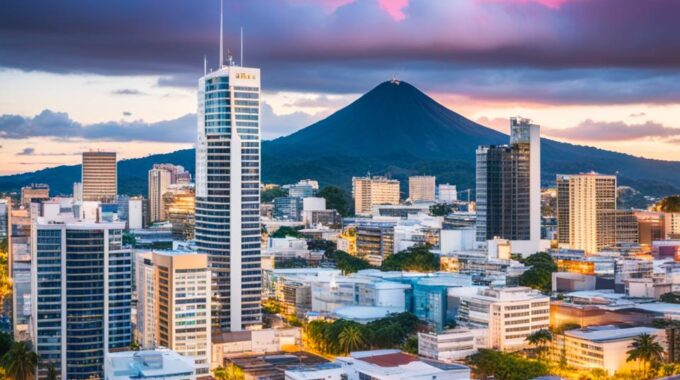Secure property investment loans in Costa Rica with Gapequityloans.com. We offer tailored financing solutions for expats and foreign buyers seeking real estate opportunities.

Home Equity Loan Rates in Costa Rica: Your Complete Guide
If you are a property owner in Costa Rica, you may be considering a home equity loan to access funds for various purposes, such as home renovations, debt consolidation, or education expenses. However, before jumping into any financial decision, it is crucial to understand the home equity loan rates in Costa Rica.
This article provides a comprehensive guide to help you navigate the home equity loan market in Costa Rica. It covers topics such as lenders, requirements, factors that affect loan rates, and tips for finding the best loan rates.
Key Takeaways
- Before applying for a home equity loan in Costa Rica, it is essential to understand the factors that affect interest rates.
- Comparing rates and terms from multiple lenders can help you find the best deal for your financial needs.
- Having a strong credit profile and being prepared to negotiate with lenders can lead to better loan rates.
Understanding Home Equity Loans in Costa Rica
A home equity loan is a type of loan that allows homeowners in Costa Rica to borrow money against the equity they have built up in their property. Unlike a traditional mortgage, which is used to buy a property, a home equity loan is a secondary loan that is secured against the value of the home. With a home equity loan, the borrower can access a lump sum of money that can be used for various purposes, including home renovations, debt consolidation or to cover unexpected expenses.
When a person takes out a home equity loan, the lender will assess the value of the property and the amount of equity the borrower has built up. The difference between the current value of the property and the remaining balance on the mortgage is the equity. Lenders will typically allow homeowners to borrow up to a certain percentage of the equity they have in their home.
Benefits of Using Your Costa Rican Property as Collateral
One of the benefits of a home equity loan is that it allows homeowners to use their property as collateral. This means that the lender has a secured interest in the home, which can make it easier to access funds and can provide lower interest rates compared to unsecured loans. Additionally, a home equity loan can provide quick access to funds, as the loan can be approved and funded much faster than traditional loans.
Another advantage of using a home equity loan in Costa Rica is that the interest payments on the loan may be tax-deductible, depending on the borrower’s circumstances. This can reduce the overall cost of the loan and make it a more attractive financing option for homeowners.
It is important to note that a home equity loan is not without risk. If the borrower is unable to make loan payments, the lender may be able to foreclose on the property. As such, it is important to carefully consider the financial implications of taking out a home equity loan and ensure that the borrower has a plan in place to repay the loan.
Factors Affecting Home Equity Loan Rates in Costa Rica
When considering a home equity loan in Costa Rica, it’s essential to understand the factors that can affect the interest rates offered by lenders. Here are some crucial elements to consider:
| Factor | Description |
|---|---|
| Credit | Borrowers with better credit typically receive lower interest rates as they are considered less risky to lenders. |
| Property value | The value of the property used as collateral can affect the loan-to-value ratio, which might impact the interest rates offered by lenders. |
| Loan amount | In general, larger loan amounts can lead to higher interest rates as they are considered more risky than smaller loans. |
| Market conditions | Fluctuations in the market can impact interest rates, and borrowers should keep an eye on economic indicators to get a sense of where rates might be headed. |
It’s important to note that these factors are not mutually exclusive. Lenders will consider them all when determining the interest rates for a home equity loan.
Finding Lenders for Home Equity Loans in Costa Rica
When looking for a home equity loan in Costa Rica, it’s important to find a reputable lender that offers competitive rates. Here are some of the top lenders to consider:
| Lender | Loan Terms | APR | Contact Details |
|---|---|---|---|
| BAC San Jose | Up to 15 years | ? % | 1-800-227-2672 |
| Scotiabank | Up to 15 years | ? % | 506-2210-0000 |
| Davivienda | Up to 20 years | ? % | 506-2287-1111 |
| Banco Nacional | Up to 25 years | ? % | 506-2212-2000 |
It’s important to note that these rates and terms are subject to change based on factors such as credit, property value, and loan amount. Borrowers should compare rates and terms from different lenders to find the best deal for their financial needs.
Requirements for Home Equity Loans in Costa Rica
Before applying for a home equity loan in Costa Rica, borrowers must meet certain requirements. These requirements typically include:
| Requirement | Description |
|---|---|
| Proof of income | Borrowers must provide documentation of their income, including pay stubs, tax returns, and bank statements. |
| Credit history | Lenders will review the borrower’s credit report to assess their creditworthiness. Good credit can lead to better loan terms and interest rates. |
| Property Appraisal | The borrowed amount is typically based on the home’s appraised value. Lenders will require an appraisal to determine the property’s worth. |
| Legal documentation | Borrowers must provide legal documentation of property ownership, such as a title certificate or deed. |
It’s important to gather all necessary documentation before applying for a home equity loan in Costa Rica. This can help speed up the approval process and ensure that borrowers meet the lender’s requirements.
Comparing Home Equity Loan Rates in Costa Rica
When it comes to home equity loans in Costa Rica, finding the best rates is crucial. Comparing rates can save you thousands of dollars over the life of your loan. But with so many lenders and loan options available, it can be overwhelming to know where to start.
Here are some tips for comparing home equity loan rates in Costa Rica:
Consider the Annual Percentage Rate (APR)
The APR includes the interest rate as well as any fees or charges associated with the loan. Comparing APRs can give you a more accurate picture of the total cost of the loan.
Compare Loan Terms
Loan terms can vary from lender to lender. Some may offer longer repayment periods, while others may offer more flexible options. Be sure to compare the terms and choose the one that best fits your financial needs.
Take Closing Costs into Account
Closing costs can add up quickly, so it’s important to factor them into your decision-making process. Some lenders may offer low-interest rates but charge higher closing costs, while others may have higher interest rates but lower fees.
Beware of Potential Penalties
Some lenders may charge prepayment penalties if you pay off your loan early. Make sure to read the terms and conditions carefully to avoid any surprises down the road.
By obtaining loan estimates from multiple lenders and comparing the factors above, you can make an informed decision and secure the best home equity loan rates in Costa Rica for your financial needs.
Benefits of Low-Interest Home Equity Loan Rates in Costa Rica
Getting a low-interest rate on a home equity loan can have numerous benefits for Costa Rican property owners. Here are some reasons to consider finding the best home equity loan rates:
- Lower monthly payments: With a lower interest rate, borrowers can save money on their monthly payments, freeing up cash flow for other expenses.
- Potential savings over the loan term: A lower rate can also lead to significant savings over the life of the loan, allowing borrowers to pay off the loan faster and reduce the overall cost.
- Increased financial flexibility: With more affordable payments, borrowers may have more financial flexibility to pursue other goals, such as investing in a business or saving for retirement.
- Easier debt management: Consolidating high-interest debt with a low-interest home equity loan can simplify debt management and potentially lower overall debt payments.
“Securing a low interest rate on a home equity loan can provide significant financial benefits for Costa Rican property owners”
It’s important to note that not all loan terms are created equal, and borrowers should always review all terms and conditions before signing any loan agreement. Additionally, borrowers should only take out a home equity loan if they have a clear plan for repayment and are confident they can meet their monthly obligations.
Expert Tips for Negotiating Home Equity Loan Rates in Costa Rica
Securing a home equity loan in Costa Rica can be a valuable financial decision, but negotiating the best rate is crucial to maximizing the benefits of the loan. Here are some expert tips to help you negotiate home equity loan rates in Costa Rica:
1. Build a Strong Credit Profile
Lenders in Costa Rica typically use credit as an important factor in determining home equity loan rates. Borrowers should strive to maintain good credit by paying bills on time, reducing debt, and correcting any errors on their credit reports. A strong credit profile can increase the chances of securing a low-interest rate.
2. Research Multiple Loan Options
Before committing to a lender, it is important to research multiple loan options to find the most competitive rate. Comparing rates from different lenders can help borrowers negotiate better terms and potentially save thousands of dollars over the loan term.
3. Negotiate with Lenders
After researching multiple loan options, borrowers should be prepared to negotiate with lenders. This may involve presenting other loan offers and discussing the terms and rates offered by competitors. Being knowledgeable about the market and the borrower’s financial profile can give leverage to negotiate better rates.
4. Leverage Market Conditions
Borrowers can take advantage of favorable market conditions to secure better rates for their home equity loan. Paying attention to interest rate trends and waiting for favorable market conditions can lead to better rates and terms on the loan.
5. Be Prepared to Walk Away
If negotiations with a lender do not lead to a desired rate or terms, borrowers should be prepared to walk away from the deal. There are plenty of lenders in Costa Rica offering home equity loans, and it is important to find one that meets the borrower’s financial needs.
By following these expert tips, borrowers can negotiate better home equity loan rates and secure a loan that meets their financial needs with the best possible terms.
Conclusion
Understanding home equity loan rates in Costa Rica is essential for making informed financial decisions. By researching lenders, comparing rates, and meeting the necessary requirements, borrowers can secure the best loan for their needs. Remember to consider factors such as credit, property value, loan amount, and market conditions when evaluating loan options.
In addition, borrowers should be prepared to negotiate with lenders to obtain competitive rates. This may include improving their creditworthiness, having multiple loan options, and leveraging market conditions. By following expert tips and advice, borrowers can increase their chances of securing the best rates.
Low-interest home equity loan rates in Costa Rica offer many benefits, including lower monthly payments, potential savings over the loan term, and increased financial flexibility. Take the time to research lenders and compare rates to find the best deal.
Overall, understanding home equity loan rates and requirements in Costa Rica is essential for making informed financial decisions. By following the comprehensive guide provided in this article, borrowers can navigate the loan process with confidence and secure the best loan for their financial needs.
-Written by Glenn Tellier (Founder of CRIE and Grupo Gap).
*Loan Request Form
FAQ
Q: What are home equity loan rates?
A: Home equity loan rates refer to the interest rates charged by lenders on loans that use the equity in a property as collateral. These rates determine the amount of interest borrowers will pay on their home equity loans.
Q: How do home equity loan rates in Costa Rica compare to other types of loans?
A: Home equity loan rates in Costa Rica can vary depending on various factors. However, in general, home equity loan rates tend to be lower than rates for unsecured personal loans, credit cards, or other types of consumer loans.
Q: What factors can affect home equity loan rates in Costa Rica?
A: Several factors can influence home equity loan rates in Costa Rica. These include the borrower’s credit, the value of the property used as collateral, the loan amount, and prevailing market conditions.
Q: How can I find lenders offering home equity loans in Costa Rica?
A: To find lenders that offer home equity loans in Costa Rica, you can research reputable financial institutions, consult with mortgage brokers, or seek recommendations from friends, family, or real estate professionals. It is advisable to compare rates and terms from different lenders before making a decision.
Q: What are the typical requirements for obtaining a home equity loan in Costa Rica?
A: The requirements for obtaining a home equity loan in Costa Rica typically include income verification, a good credit history, property appraisal, and legal documentation related to the property. It is important to gather all necessary documents before applying for a loan.
Q: How can I compare home equity loan rates in Costa Rica?
A: When comparing home equity loan rates in Costa Rica, it is important to consider the annual percentage rate (APR), loan terms, closing costs, and potential penalties. Obtaining loan estimates from multiple lenders can help you make an informed decision.
Q: What are the benefits of securing a home equity loan with low-interest rates in Costa Rica?
A: Securing a home equity loan with low-interest rates can lead to lower monthly payments, potential savings over the loan term, and increased financial flexibility. It is advantageous to find the best rates to maximize these benefits.
Q: How can I negotiate home equity loan rates in Costa Rica?
A: To negotiate home equity loan rates in Costa Rica, it is important to have a strong credit profile, explore multiple loan options, and be prepared to negotiate with lenders. Improving creditworthiness and leveraging market conditions can also help in securing better rates.
Contact us for more information, or fill out a loan request now!
Want to invest? – Click HERE.
Looking for Real Estate? – Click HERE.
Looking for a Relocate Tour – Click HERE.
Need Residency status in Costa Rica? – Click HERE.
Article by Glenn Tellier (Founder of CRIE and Grupo Gap)





